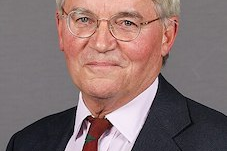Quakers focus on environment, peace, economy at annual gathering

The environment, peace and the world economy were the main issues Quakers brought to their Yearly Meeting in London this week, where about one thousand people gathered, including 150 children and young people who contributed to main sessions and had a parallel programme.
Some of those gathered had just returned from the world conference of Quakers in Kabarak, Kenya, bringing with them accounts from Quakers in the Arctic, Asia, Pacific and Africa regions of climate chaos, wars, job loss, inequality and violence. "All of these are driven by our dominant economic systems. We are called to be patterns and examples in a twenty first century campaign for peace and ecojustice, as difficult and decisive as the nineteenth century drive to abolish slavery," they said.
Those two themes of peace and ecojustice ran through the Yearly Meeting with major sessions and workshops exploring the effects of what urban economist and Quaker David Cadman called the catastrophic collapse of the old economy and search for the 'good economy' that reflects Quaker principles and values of simplicity, truth and equality. "If the economy is to be good it can only be just. An economy that is not just is not sustainable, since it is false. In truth, sustainability, goodness and justice are one." He spoke from 25 years' experience of forecasting markets.
Yearly Meeting said: "We need both our passion and a clearer understanding of economics. Let us dream, but let us also hear the pain, hunger and despair of those who have no choice. Let us stand in the Light, pray for the emergence of a 'good economy', and practise our opposition to the current system: in our lives and in the
deeply spiritual process of putting our money in better places."
These sessions carried forward the decision Quakers in Britain made last year to become a low-carbon sustainable community. Speakers reported progress, for instance one Quaker meeting had been able to show a reduction in energy usage from nearly 53,000 units of electricity in 2004 to 3,500 in 2011, a saving of 93 percent in seven years.
Recording Clerk Paul Parker said: "Underpinning all this was our worship in stillness and careful listening to other's experience. We particularly valued learning from each other what it means to be a Quaker, for instance Geoffrey Durham speaking about the Quaker stillness that can engender radical change." Quakers were urged to respond to the government's consultation in England and Wales on equal marriage. "The liberal voice is being drowned out by those who want to keep the status quo. Fifty years' careful consideration has led Quakers to say we value all loving relationships equally. We consider that any legislation for equal marriage should include the liberty of Quakers to conduct marriages in our meeting houses," the Recording Clerk told Yearly Meeting.
The Quakers were gathered in the historic large meeting house in Friends House, scene of many peace rallies over the years addressed by significant visitors, including Gandhi. Trustees have recently applied for planning permission for the major refurbishment costing £4.25 million agreed last year. Clerk of trustees, Jonathan Fox told Yearly Meeting that after long and difficult discernment the trustees decided it was not right to accept the offer to incorporate a feature called a Skyspace, by the distinguished Quaker artist, James Turrell. Some questioned how this decision was taken, others spoke of the end of a dream, others of relief that a further £1.4 million would not be spent on the Skyspace. The annual Swarthmore Lecture, established in 1907, and under the care of Woodbrooke Quaker Study Centre trustees, was given on Saturday. In Snakes and Ladders, Quaker human rights lawyer, Rachel Brett, of Quaker United Nations Office, spoke on Quaker work on human rights at the United Nation. She said QUNO's role is to try to understand what brings about change, where the potential points of change are and how to use and reinforce them. She described both the high-profile and quiet processes which have put such issues as child soldiers, internally displaced persons and children of prisoners on the international agenda, and gained the recognition of conscientious objection to military service as inherent in the right to freedom of thought, conscience and religion. New work on the children of prisoners focuses on the impact on children of having a parent executed or under sentence of death.
Reflecting on how QUNO works Rachel Brett said: "For me, one of the profound insights of Quakerism is the value of each human being because of the divine spark in each - whatever their age, or status, or whatever they may have done - with its corollary that no-one should be dehumanised, stigmatised or labelled. From this basis, recognising that each individual's dignity and rights should be protected, it seems to me self-evident that Quakers should engage in human rights work."
For more information and audio presentations of some speeches and interviews see: www.quaker.org.uk
Source: Quakers


















